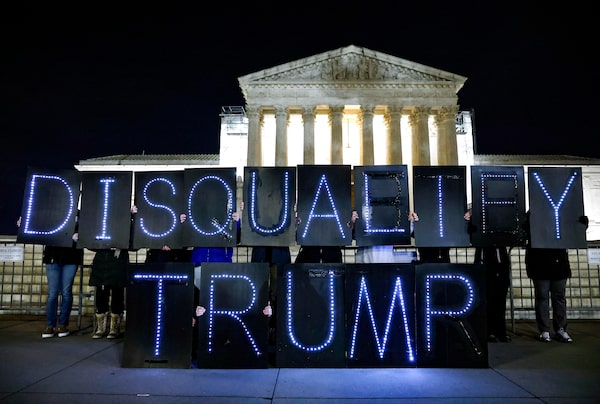Krista Kafer, shown in Littleton, Colo., is one of the plaintiffs in a Colorado Supreme Court ruling disqualifying Donald Trump from the state's Republican primary ballot.Kevin Mohatt/Reuters
Krista Kafer was playing Scrabble in the kitchen of her mother’s house in South Carolina when she overheard the television in the other room. It was tuned to Fox News, where lawyer Emily Compagno was discussing a Colorado Supreme Court decision to bar Donald Trump from Republican primary ballots in the state. The court found that he was constitutionally proscribed from running for office because he had participated in insurrection.
“Here’s just yet another way that they are trying to take him down,” Ms. Compagno said of the case. “And most importantly, another way that they – meaning the liberal leftist woke Democrats – are trying to take away power from the people.”
Ms. Kafer knew better than anyone on the screen who “they” were. She was one of six people who had put their names on the lawsuit that led to the Colorado decision.
But she is no leftist. She is a committed Republican who has worked as a Congressional staffer. She has spent time with the conservative Heritage Foundation, and voted for Mr. Trump in 2020.
What she could not abide was his unwillingness to accept his loss in that election, or his speech to a crowd in Washington on Jan. 6, 2021, before that day’s attacks on the U.S. Capitol.
“You’ve got a person who took an oath and later tried to subvert the very institution that he swore to uphold,” she said.
“I just wanted to do something to stop the madness.”

Members of the advocacy group MoveOn rally in Washington on Feb. 1 outside the U.S. Supreme Court, which will decide whether to allow Mr. Trump's disqualification from primary ballots.Photo by Paul Morigi/Getty Images for MoveOn
On Thursday, the U.S. Supreme Court will hear an appeal of the Colorado decision, which has been stayed pending the higher court’s ruling. Lawyers for Mr. Trump have warned that, if the decision stands, it could disenfranchise tens of millions of voters and “unleash chaos and bedlam if other state courts and state officials follow Colorado’s lead and exclude the likely Republican presidential nominee from their ballots.”
Supporters of Mr. Trump have placed blame directly on Ms. Kafer and the five other Colorado petitioners. “Benedict Arnold was an American hero, until he wasn’t,” said Dave Williams, chairman of the Colorado Republican party. “These people are traitors to their party, pure and simple.”
But the efforts to erase Mr. Trump from the ballot are part of a much broader erosion in support for the partisan power structures that underlie American democracy. It’s not simply that some conservative voters want nothing to do with the former president. Their legal action against him comes at a moment of widening disaffection with Republicans and Democrats alike.
The American electorate is now marked by “disgust with both parties,” said Norma Anderson, a former member of Colorado’s state legislature who is another of the petitioners. “Parties don’t work anymore, in my opinion.”
In Colorado, people unaffiliated with either party vastly outnumber those registered with either the Democrats or Republicans. National polling by Gallup over the past two years has shown an average of 27 per cent of Americans identify with the two main parties. More than 42 per cent say they are independent. The prospect of a rematch between President Joe Biden and Mr. Trump – both comparatively unpopular candidates – has done little to reverse that trend.
“Lots of folks are sitting on the sidelines, hoping four years from now we have different choices,” said Doug Friednash, a Colorado attorney and political analyst with extensive experience in the state’s Democratic politics. “What’s happened is, as people feel more disconnected from parties they register as independent.” The broader dynamics of U.S. politics, he said, provide little reason to expect different in the future. “Parties have moved to their farther extremes,” he said. “It is going to be so hard for moderates on both sides to take back the political parties.”
For some, the Colorado lawsuit marks an attempt to stake out ground for those who continue to reject the extremes. If Republicans are defeated in the coming election, “it will be essential to have a rebirth, and in a more responsible, ethical way,” said Claudine Schneider, another petitioner, who served in the U.S. Congress as a Republican representative from 1981 to 1991. She said she felt a moral obligation to oppose Mr. Trump. She also hopes to “have some voice, perhaps not today in the Republican party – but definitely tomorrow.”
But the current party leadership shows no sign of listening. A county wing of the party formally censured several of the lawsuit petitioners. The party has added Ms. Kafer and Ms. Anderson to a RINO – “Republican in Name Only” – hall of shame.
Norma Anderson, 91, is one of six Republicans behind the Trump lawsuit in Colorado. She holds a copy of the U.S. Constitution she has thumbed through during the legal saga.Nathan VanderKlippe/The Globe and Mail
It’s a jarring contrast to Ms. Anderson’s record as one of the state’s most accomplished Republicans, who spent nearly two decades in the Colorado legislature. Her living room is decorated with a framed flag that was flown over the U.S. Capitol in honour of her service. She regularly thumbs through a paper copy of the Constitution.
And she was sitting in front of her television on Jan. 6, watching events that she is convinced amounted to an insurrection in which Mr. Trump played a role. “I just couldn’t believe what was happening,” she said.
She plans to be in Washington on Feb. 8 for the Supreme Court appeal hearing. She argues that Mr. Trump has disqualified himself from running for the presidency under the 14th amendment of the Constitution, which bars from office anyone who has “engaged in insurrection or rebellion” against the country. “I believe in democracy. And he doesn’t,” Ms. Anderson said of Mr. Trump. “A man that tries to overturn an election – what would he do next time?”
Ms. Anderson is 91. Mr. Trump is the only Republican candidate who has not earned her vote for president.
Other groups of Republicans have spurned Mr. Trump. Efforts like the Lincoln Project have enlisted high-profile support but had little discernible effect on the former president’s popularity.

Dave Williams is chair of the Colorado Republican Party.David Zalubowski/The Associated Press
Mr. Williams, the Colorado Republican party chair, accused Ms. Anderson and the others of acting against Mr. Trump “because they’ve lost their power and influence in a party that no longer values their failed leadership.”
“These people are upset because Donald Trump ushered in a movement of Republicans who were tired of the establishment power brokers and insiders continually taking the American taxpayer for a ride,” he said.
If the effort to take Mr. Trump off the ballot succeeds, he warned, “you’ll see Republican states start to remove Joe Biden.”
In Colorado, he added, the party is ready to abandon primary voting if the Supreme Court’s decision results in Mr. Trump being removed from the ballot.
The state’s Republicans could use a caucus system, instead, which the party believes would allow its members to still vote for Mr. Trump.
Ms. Kafer worries what will happen to U.S. politics if courts don't send a clear message that insurrection is unconstitutional.Kevin Mohatt/Reuters
It’s enough that people like Ms. Kafer are questioning their political affiliation. Maybe, she said, a new party should be launched. She has considered supporting a third-party candidate in the November election.
Her recent visit to South Carolina underscored the historical importance of the Constitutional provisions. In Abbeville, S.C., Secession Hill still marks the location where thousands gathered in 1860 to push for withdrawal from the Union, one of the events that propelled the slaveholding South toward civil war.
The 14th amendment was adopted eight years later, as Congress sought to keep unrepentant Confederacy leaders from returning to power.
Ms. Kafer believes similar logic should apply to Mr. Trump. “Secession and insurrection and rebellion are different things. But it’s different in scope, not in character,” she said.
If the constitutional provisions on insurrection are not upheld, she warned, “what we do is we greenlight that behaviour going forward.”
It would send a signal, she believes, to the loser of any future election that “you can generate a giant lie and push it so hard that people are willing to take up arms on your behalf.”
U.S. politics: More from The Globe and Mail
The Decibel podcast
Since Florida won approval to import cheaper wholesale drugs from Canada, other states, including Colorado, want to do the same. The Globe’s Nathan VanderKlippe spoke with The Decibel about the potential impact on Canadians’ access to medication. Subscribe for more episodes.
From our foreign correspondents
Five key questions following Trump’s triumph over Haley in New Hampshire primary
Analysis from David Shribman
Haley battles on, but path to victory over Trump remains narrow
Trump and Haley appear to be swapping personalities to get ahead in U.S. presidential race
Ron DeSantis’s fall is one of the most dramatic political stories in recent history